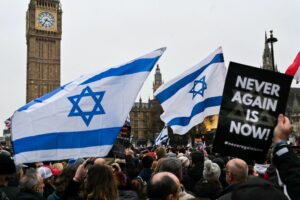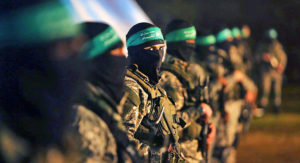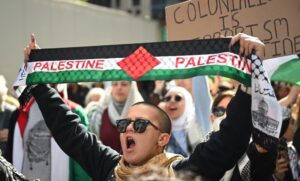The 1945 meeting between American President Franklin Roosevelt and Saudi Arabia’s King Abdulaziz, which laid the foundation for their nations’ enduring relationship, is often portrayed as an exchange of oil for security cooperation. But in reality, oil was hardly discussed. The conversation aboard the USS Quincy, afloat in the Suez Canal, focused on Palestine.
President Roosevelt told King Abdulaziz how the Jews of Europe had suffered indescribable horrors at the hands of the Nazis: eviction from their homes, destruction of their property, torture of their families, and mass murder. Could the king help with their resettlement?
The king replied that the Jews and their descendants should be given the best “lands, flocks and wells” of the Germans who had oppressed them. When the President said that the Jews did not trust the Germans and had no desire to stay in Germany, Abdulaziz replied that if the Allies did not think they could control the Germans, then why had they fought such a costly war? Certainly, he would never leave a defeated enemy in a position to strike back in the future.
When the President tried again, he received a similar reply: “Amends should be made by the criminal, not by the innocent bystander. What injury have the Arabs done to the Jews of Europe? It is the Christian Germans who stole their homes and lives. Let the Germans pay.” Had Roosevelt not dropped the issue, the meeting might well have ended acrimoniously.
Today, the relationship between Saudi Arabia and the Jewish people has once again come under scrutiny. A historic peace deal between Saudi and Israel has been put on hold since the outbreak of war in Gaza. And the week before last, Saudi Crown Prince Mohammed bin Salman (MBS) called for an “immediate halt to Israeli military operations in Gaza”.
Yet Saudi leaders have always been pragmatists. Two years after the meeting on the USS Quincy, King Abdulaziz’s son, the future King Faisal, led the Saudi delegation to the United Nations, where he tried to prevent the partition of Palestine. He failed, and the United States successfully mobilised support for partition. But although King Abdulaziz was angry and disappointed by Washington’s recognition of Israel, he never threatened the American air base or oil concessions in Saudi Arabia. He placed too great a value on promoting regional stability and maintaining strong relations with the US to risk a diplomatic confrontation.
For most of the last 75 years, Saudi Arabia has tried to stay out of Arab-Israeli wars and promote reconciliation. In 1948, the Saudis contributed two companies of infantry, which fought under Egyptian command. In the Six-Day War of 1967, a Saudi brigade moved slowly towards Jordan, arriving only when a ceasefire was about to be declared. And during the 1973 Arab-Israel War, Saudi Arabia sent one brigade to join the Arab Foreign Legion with strict instructions not to become involved in the fighting. By the time it reached Damascus, the hostilities were over.
King Abdulaziz (1875-1953) was always more worried about his Hashemite rivals in Jordan and Iraq than about Israel. His son, King Faisal (1906-1975), regarded Gamal Abdel Nasser’s Egypt, not the Jewish state, as the greatest threat to his kingdom. And today, Saudis are far more concerned with threats from Iran and it proxies in Yemen and Iraq than they are with Israel.
After the 1967 Arab-Israeli War, Arab leaders met in Khartoum, where they adopted their reflexive “Three Noes” with regard to Israel. “No recognition, No negotiation and No reconciliation.” With the exception of Egypt, this remained their unanimous, unwavering and unhelpful position for the next 15 years. Only in 1981 did the then Saudi Crown Prince Fahd (1921-2005) put forth a fresh proposal by which “all states in the region should be able to live in peace”. Fahd’s plan did not explicitly recognise Israel, but it implied that this was possible after the creation of a Palestinian state and a return to Israel’s 1967 borders.
That was a radical proposal 42 years ago. A watered-down version of Fahd’s plan was adopted in 1982 by Arab leaders meeting in Morocco. Known as the Fez Plan, it remains the Arab League’s policy to this day. President Ronald Reagan called it “the single largest step towards peace on which the Arab World has been able to agree”.
In 2002, then Crown Prince Abdullah (1924-2015) repeated the Saudi offer to Israel to the New York Times columnist Thomas L. Friedman: “full withdrawal from all the occupied territories, in accord with UN resolutions, including Jerusalem, for full normalisation of relations.” The following month Abdullah presented his plan to the Arab Summit in Beirut, where a modified version was unanimously adopted. The Beirut Plan differed from the Fez Plan in that it explicitly stated the conditions under which the Arabs would “consider the Arab-Israeli conflict over and sign a peace agreement with Israel”.
At both Fez and Beirut, the Saudi proposals were more forward-leaning than the eventual Arab consensus. In both instances, however, the Saudis led the effort by taking political risks and spending financial capital to convince other Arab leaders to go as far as they did. Neither proposal was fully acceptable to Israel or the United States. However, they remain the most constructive plans put forward by the Arabs to date. King Salman has reaffirmed them more than once.
On top of its own initiatives, Saudi Arabia has almost always supported American efforts to negotiate an end to the Arab-Israeli conflict. The only notable exception was its breaking off of diplomatic relations with Egypt in 1979 after President Anwar Sadat signed the Camp David Accords with Israel. Yet even when Riyadh followed the Arab consensus in severing ties with Cairo, the Saudis did not completely cut off financial aid to Egypt, or expel thousands of Egyptian guest workers from their country.
In 2020, the Trump Administration orchestrated the Abraham Accords, through which the United Arab Emirates, Bahrain, Sudan and Morocco all normalised relations with Israel. Riyadh implicitly supported the deal by allowing Saudi journalists to write op-eds praising it. It is unlikely it would have materialised had the Saudis strongly objected and Riyadh implicitly supported the settlement by allowing Saudi journalists to praise it.
In recent years, the benefits for Saudi of making peace with Israel have significantly increased, while the costs have appeared to decline. The latter were largely political: older Saudis who grew up with Nasser’s Arab Nationalism continue to regard unwavering support for Palestine as an essential part of their Arab identity. As the guardians of Mecca, the Saudis cannot ignore widespread sympathy for Palestine in the Muslim world. Nor can they remain indifferent to the status of the Muslim holy sites in Jerusalem.
Yet peace with Israel would be a massive boost to Saudi Arabia’s national security. It would improve Saudi Arabia’s relations with its most important security partner, the United States — and reduce opposition to those relations among the Saudi public. What’s more, peace would strengthen Saudi Arabia’s hand against Iran, which since the 1979 Iranian Revolution has challenged Saudi leadership in the Muslim World and sought to extend its influence in Lebanon, Iraq, Syria and Yemen. Despite the recent Saudi-Iranian rapprochement, Saudi and Israeli leaders still share many reasons to resist Iran’s pursuit of regional hegemony and nuclear weapons.
Saudi Arabia and Israel have another goal in common: suppressing radical Islamist groups such as al-Qaeda, Isis, and the Muslim Brotherhood. Like the Shi’a revolutionary government in Tehran, many radical Sunni Islamist groups seek to destroy both Israel and the Arab monarchies. Having suffered from numerous al-Qaeda attacks themselves, the Saudis understand the threat of jihadist militants. They have a long-strained relationship with Iranian-backed Hamas, as well as its junior partner, the Palestinian Islamic Jihad. Saudi authorities have arrested or deported Hamas supporters in Saudi Arabia and would quietly welcome the organisation’s demise. This gives Saudi Arabia and Israel further grounds for cooperation.
The two nations also have economic interests in common. MBS has staked his political future on the success of Vision 2030, an ambitious development programme that aims to diversify his economy away from oil. But his reforms won’t succeed if the Middle East is consumed by a major war, and therefore it is in his interests to promote lasting peace with Israel.
Furthermore, to succeed, Vision 2030 will require foreign direct investment, technology transfer, increased non-oil trade, and even more tourists — all of which Israel has in abundance. Another goal of Vision 2030 is the creation of a local defence industry. Saudi Arabia has a defence budget larger than Britain or Germany, but today nearly all its weapons and military equipment are imported. The new General Authority for Military Industries wants to change that — and Israel, with its sophisticated defence industry, is well-placed to help.
Ironically, the terrorist attacks of October 7 have made a Saudi-Israeli peace deal both more desirable — and even more difficult. Those who thought that regional peace could be established without addressing the plight of the Palestinians have been proven wrong. Instead, pro-Palestinian sympathies have been reignited across the Muslim world. It is now unthinkable for any Saudi leader to embrace peace with Israel before meaningful progress is made towards establishing a Palestinian state.
With the terrorist attacks of October 7, Hamas has managed to derail efforts to establish Saudi-Israeli peace. And yet, Saudi Arabia and Israel remain united in their desire to avoid a larger regional conflict, eliminate terrorism, and reinvigorate that peace process. The case for rapprochement remains compelling and their leaders remain interested in it. But in an increasingly multipolar world, it will require a determined, coordinated, multinational effort to comfort the injured, reassure the fearful, calm the angry and remove the remaining political obstacles to peace.
Disclaimer
Some of the posts we share are controversial and we do not necessarily agree with them in the whole extend. Sometimes we agree with the content or part of it but we do not agree with the narration or language. Nevertheless we find them somehow interesting, valuable and/or informative or we share them, because we strongly believe in freedom of speech, free press and journalism. We strongly encourage you to have a critical approach to all the content, do your own research and analysis to build your own opinion.
We would be glad to have your feedback.
Source: UnHerd Read the original article here: https://unherd.com/





